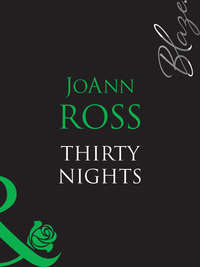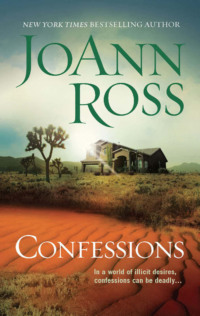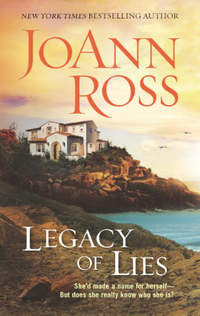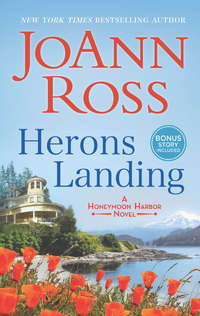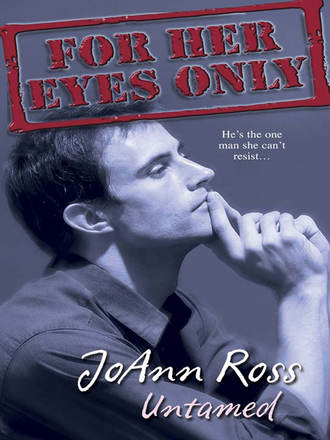
Полная версия
Untamed

A clap of thunder shook the porch…
Gavin, who had dozed off in a large wing chair positioned to give him a good view of the front windows, was jolted awake by the crack of thunder and almost simultaneous bolt of lightning. On some subconscious level he’d been aware of a loud thud just after the lightning flash that had obviously struck very close to the house.
“All right!” It was what he’d been waiting for, an opportunity to catch the vandals in the act. He ran into the foyer and yanked open the ornately carved front door.
Instead of the teenage boys he’d thought he would find, Gavin found himself staring down at a seemingly lifeless form lying at his feet. When another flash of lightning—thankfully more distant this time—lit up the sky, he stared in disbelief at a woman who could have stepped right out of that long-ago photograph of Brigid Delaney.
JOANN ROSS
New York Times bestselling author JoAnn Ross has written over seventy novels and has been published in twenty-six countries, including Russia, China, France and Turkey. Two of her titles have been excerpted in Cosmopolitan magazine and her books have also been featured by Doubleday Book Club and the Literary Guild. She’s received numerous awards, including a Lifetime Career Achievement Award from Romantic Times magazine, and is a popular conference speaker. JoAnn lives with her husband in Tennessee, where she gains inspiration from the view of the misty Smoky Mountains out of her home office windows.
Untamed
Joann Ross


Contents
Chapter 1
Chapter 2
Chapter 3
Chapter 4
Chapter 5
Chapter 6
Chapter 7
Chapter 8
Chapter 9
Chapter 10
Chapter 11
Chapter 12
Chapter 13
Chapter 14
Chapter 15
1
A full moon rode high in the midnight sky, casting a shimmering silver light over the ancient forest, illuminating the lone woman who moved with the suppleness of a sleek jungle panther amidst the tangled trunks of the leafless oak trees. Her hooded black cape blended into the shadows as she made her way through the swirling mists of fog to the clearing.
The night was silent save for the sad sigh of the north wind in the tops of the towering pine trees, the occasional sweet, lonely cry of an owl, the croaks of frogs in the meadow pond. The familiar night sounds were primal music to the woman’s ears, reaching deep into her soul, stirring the wildness that lurked in her heart.
It was music from an ancient time, a time when primitive man trembled with fear against the unseen denizens of the dark night. A time when her people ruled with wisdom and power.
A time of magic.
When she reached the clearing, the woman turned her exquisite face skyward and received a warm infusion of energy from her mother, the moon. She lifted her arms, palms turned upward toward the icy stars. Her ripe vermilion lips began chanting words taught to her while still in her cradle. Words passed down from generation to generation, words that flowed warmly through her veins along with the blood that made her who she was.
And what she was.
A witch.
Her greeting completed, she slipped off the hooded cape and let it fall to the ground. The wind caught her freed long hair, whipping it into a wild jet froth about her face. Beneath the hood, she was wearing the clothes she always donned when fighting those who would use the night to cloak their evil ways.
The jet metal breastplate of the sleek black bodysuit shaped her lush breasts into two glistening cones in a way that was designed to send male pulses hammering. Black leather boots encased her long legs to mid-thigh.
Around her neck, she wore a silver chain on which hung a silver amulet that nestled between those glorious, uplifted breasts. The woman opened the amulet and took out a small vial of scented oil, which she sprinkled over the wood she’d already gathered and stacked in the sacred circle of stones.
With the powers of midnight vibrating through her, she held her hands out over the wood, which instantly ignited in a whoosh of wind and flame.
Closing her eyes, feeling the heat of the crackling fire in the marrow of her bones, the woman known as Morganna concentrated on the faces of her enemies. In her mind she saw them melting like candles amidst the dancing, deadly flames. She heard their agonized screams. And suffered their pain. Spellmakers who dealt in the dark side did not escape unscathed.
A lethal heat suffused her, fire flicked at her nerve endings, but Morganna did not flinch. Nor did she cry out. These acts of vengeance were her calling. Since her fate was both preordained and inescapable, she bore her pain in silence.
And when it was completed, when the scorching flames gave way to the cooling, comforting rain, she lifted her arms once again to the midnight sky and offered a prayer of thanksgiving.
“It is done,” she said finally, breathing a deep, satisfied sigh of achievement.
She was physically and psychically drained. Her legs had as much substance as the sea as she slowly folded to the ground. For an unfathomable time her mind was washed clean, healing her of the torturous burdens she’d willingly undertaken.
“IT IS DONE.”
Gavin Thomas nodded with satisfaction as he signed his name to the last frame of this latest adventure of Morganna, Mistress of the Night.
The crime-fighting witch had outdone herself this time. And looked damn good while doing it, he decided, casting a judicial eye over the full-color drawing of the luscious female body glowing orange and silver from the moon and firelight.
Gavin would be the first to admit that his creation probably stirred up the hormonal juices in more than one teenage male. But what was so wrong with that? he’d asked detractors on more than one occasion. Besides, his graphic novels—which those same detractors insisted on calling comic books—were not nearly as sexually explicit as the stuff kids saw every day on those rock and rap videos on MTV.
And Morganna, while admittedly dabbling in black magic, was, after all, a force for good. For truth, justice, Mom, apple pie and the American way.
She was, he’d told late-night TV talk-show host Tom Snyder just last week, this generation’s Superman. But a lot better looking.
He’d even finished up the interview by saying that if he ever met a female who was half the woman the fictitious Morganna was, he’d marry her on the spot.
Tom had laughed—that familiar too-many-cigarettes rasp—as he was supposed to. What the talk-show host had no way of knowing was that Gavin wasn’t joking.
THE LETTER ARRIVED in the morning mail. Tara Delaney did not have to open the cream linen envelope to know what the letter inside would say. The return address—from an Arizona attorney—told her all she needed to know.
Why wouldn’t they leave her alone?
She tossed the letter unopened into the wastebasket beside her desk, went into her bedroom and tried to resume packing for her long overdue vacation. With her usual attention to detail, she’d planned the trip to Kauai months ago. A beachfront condo was booked for the next two weeks, her airline tickets had been purchased weeks ago and she’d even bought two new bikinis and a sheer white cover-up. Tomorrow she’d be lying on the beach, soaking up the tropical sun and beginning to make her way through the stack of novels she was always buying but never had time to read.
“You deserve this vacation,” she reminded herself as she packed her toiletries. “You’ve earned it.” She tossed the sunblock into a plastic-lined zipper bag. “You can’t let anything—or anyone—stand in your way.”
It was a dandy little pep talk, and it should have worked. Would have worked had it not been for the siren call of that discarded letter.
“Oh, hell.” She stomped back into the living room, pulled the envelope out of the wastebasket and opened it with the sterling-silver opener fashioned in the shape of a Celtic cross she’d received as a Midsummer Day gift from her artist father. The paragraph of legalese repeated what the other letters had told her: that she was now the proud owner of a one-hundred-year-old Victorian house in Whiskey River, Arizona.
Sighing, she put the letter down, picked up the phone and dialed a number she knew by heart.
“Hello, Tara dear,” the smoothly modulated voice answered after the first ring. “I was just thinking of you.”
Tara stifled a sigh. “It figures.”
“A mother always knows when her child is upset,” Lina Delaney said. “As you’ll discover yourself someday.”
Tara was suddenly reminded of all the times while she was growing up she’d tried to put something over on her mother. And failed.
“It would be nice,” she said crankily, “if just once I could keep something to myself.”
“Your thoughts are your own, Tara.” Her mother’s tone remained steadfastly calm, as always. “I would certainly never pry.”
Tara decided this was not the time to mention that little episode during her seventeenth summer when she’d lied about a slumber party at Mary Bretton’s house in order to spend the night with Jeff Townsend, whose parents were out of town for the weekend. Her mother had phoned the Townsend house before Jeff had managed to get her blouse entirely unbuttoned. A pregnant little pause settled over the long-distance telephone lines.
“Is this about your grandmother’s house?” Lina finally asked.
“No.” Tara shook her head firmly. “Definitely not.”
“Oh.” A disappointed tone crept into her mother’s voice. “I was hoping you’d changed your mind about keeping your inheritance.”
Tara figured she’d already inherited enough problems from her grandmother, Brigid Delaney. “I told you, Mom, I don’t want the house.”
“Then why don’t you sell it?”
Good question. And one Tara had asked herself at least once a day during the six months since her grandmother’s sudden death.
“Are you going to be home this afternoon?” she asked suddenly.
“For my only daughter? Of course,” Lina said without hesitation. “I’ll make that marigold custard you like so well.”
“That sounds wonderful.”
Despite her uncharacteristic moodiness, Tara was smiling as she hung up the phone. Her mother might not resemble a typical American mom, and she definitely didn’t bear the faintest resemblance to those early television mothers that showed up on late-night cable television, but the one thing Lina Delaney and Mrs. Cleaver had in common was the notion that there was no problem a home-baked dessert couldn’t solve.
Five minutes later, as she pulled out of her driveway, Tara found herself wondering how Wally and the Beav would have handled having a white witch for a mother.
GAVIN CURSED as he passed Brigid Delaney’s house on the way to the post office and saw that another window had been broken. Although he told himself that he should be grateful that breaking the windows of what was known as “the witch’s haunted house” was as bad as juvenile crime got in Whiskey River, it still irritated him that the kids couldn’t just go out to the dump and shoot at tin cans with BB guns like kids in other rural towns.
Over breakfast at the Branding Iron Café, Trace Callahan, Whiskey River’s sheriff, suggested the logical solution. “I’ll have J.D. board the windows up,” he said as he dug into his Rustler’s Special—steak, eggs and cottage fries.
“It shouldn’t be the county’s responsibility,” Gavin said grumpily. “If Brigid’s damn granddaughter would just do something with the house—move into it, sell it, burn it down, even—we wouldn’t be having this discussion.”
“Are you sure she’s been notified?”
“I know Brigid’s attorney sent official notification, then followed up with a bunch of letters. Hell, I wrote a couple myself. But there hasn’t been any response.”
“Maybe she’s moved.”
“Then the letters should come back.”
“True.” Trace considered that for a moment. “Maybe the county will take the house over when she falls behind in her taxes. In the meantime, it’s becoming a public nuisance. The closer we get to Halloween, the more likely it is that one of those kids is going to burn the place down. Since I want to avoid that, it only makes sense to have J.D. board up the windows. And bolt the doors.”
“Bolts and boards aren’t free. Last I heard the Mogollon County bookmobile was having to cut back on hours because of a lack of funds.” He didn’t mention sending in a sizable anonymous donation to keep that from happening.
Trace shrugged. “We’ve got some spare pieces of plywood hanging around after replacing the damage last month’s storm did to the jail roof. No point in it going to waste. As for J.D., I don’t think he’d mind doing the job off the books.”
This was another thing Gavin liked about small towns. In the city, such a suggestion would call for innumerable oversight committees, public hearings, newspaper editorials and Lord knows what else. Here in Whiskey River, things were definitely more laid-back. The live-and-let-live attitude was one of the reasons he’d chosen to settle here.
“Thanks for the offer, but I don’t mind replacing the windows. Mostly I was just blowing off steam.”
Trace eyed him over the rim of the coffee mug. “You know, Brigid Delaney’s windows aren’t your responsibility, either.”
“That’s what I keep telling myself,” Gavin said.
“And?”
“And for some reason I can’t make myself believe it.”
“Maybe she cast a spell on you,” Trace joked.
“That’s one answer. Of course to believe it, I’d have to also believe that the old lady was a witch.”
“So are you saying she was a fraud? Or a liar?”
“Neither. Not exactly.” Gavin frowned into the thick black depths of his coffee as he framed his response. “I think she honestly believed that she possessed special powers. And from the business her mail-order herb catalog brought in, it’s obvious a lot of other people around the country thought so, too. But I’ve just never bought into the notion of ghosts and goblins and things that go bump in the night.”
“Yet the heroine of all your books is a witch.”
Gavin was grateful when Trace referred to them as books and not comics. Not many people bothered to make the distinction.
“I created Morganna to fill a niche,” he said. “And to fill all those hours when I was behind bars.” Gavin’s scowl darkened as it always did when he thought back to his imprisonment. “Just when I thought for sure I’d go stir-crazy, I read about Wicca being one of the fastest growing religions in the country and decided to cash in on a trend.”
And cash in he did. The success of Morganna, Mistress of the Night, had been nothing short of phenomenal.
“If you ask me,” Trace said in a drawl that harkened back to the Texas roots he shared with Gavin, “Morganna’s success has as much to do with her crime-fighting outfit as it does her sorcery.”
Because the comment came from a man Gavin considered a good friend, a man whose dogged devotion to the truth had eventually earned him his freedom, Gavin didn’t take offense. Especially since it happened to be true.
“Got a point there,” he said agreeably. His quick grin faded as his thoughts returned to Brigid’s house. “Although I never believed Brigid was a witch, unfortunately the kids in town do. Which is why they seem determined to break every window in the damn house.”
“I wish I had the resources to put a man on the place for a few nights,” Trace mused. “The problem with teenage vandalism is that it can lead down a rocky path straight to a jail cell.”
Knowing that the former big-city cop had put in his own time on the wrong side of the bars in the juvenile justice system, Gavin figured Trace knew what he was talking about.
“You know,” he said, “that’s not a bad idea. I don’t know why it didn’t occur to me sooner.” The more he thought about it, the more he liked it. “I could do that.”
“Do what?”
“I could spend a couple of nights in the house. Wait for the kids to break a window, catch them in the act, then bring them to you for the scared-straight lecture.”
Trace’s expression was decidedly doubtful as he considered the proposed plan. “You’re not talking about being armed or anything?”
“Hell, Trace, you know I’ve never owned any guns. I just want those kids to leave the old lady’s house alone.”
“I hadn’t realized you were that close.”
“Neither had I,” Gavin admitted. “Until she was gone. Then I realized that somehow, when I wasn’t looking, she became the closest thing to a real family I’ve had in years.” He put some money on the table and stood. “Give Mariah a hug for me.”
Trace smiled at the mention of his wife’s name. Not a day went by that he didn’t consider himself the luckiest man on the face of the planet to have had such a gorgeous, sexy, intelligent, talented woman fall in love with him.
“She’s been away for four days wheeling and dealing in L.A., and as soon as she gets back tonight I intend to give her a lot more than a hug,” he said. “But I doubt your name will come up.”
Gavin laughed. “You’re a lucky man, Trace.”
“That’s what Mariah keeps telling me.” Trace grinned back. “You know, marriage isn’t such a bad institution, pal.”
“That’s what you keep telling me. And call me crazy, but having already experienced life in an institution, I think I’ll pass.”
“I’m serious.” Sober gunmetal gray eyes echoed Trace’s words. “From what I can tell, you spend all your time working.”
“When you love what you’re doing, it isn’t work,” Gavin automatically responded with the answer he usually gave to interviewers who remarked on his apparent lack of any life outside his work.
“Yeah, I read that quote in Newsweek.” Trace waved the words away with his left hand, his simple woven-gold wedding band gleaming in the buttery morning light. “I didn’t buy it then and I don’t now. The way it looks to me, all you’ve done is change your prison stripes for a denim jacket.”
“What’s that supposed to mean?”
“It means that the trappings may have changed. But although you’ve said that one of the reasons you came to Whiskey River was to enjoy life, you might as well still be spending your days behind bars.”
Gavin frowned. “That’s not a real attractive image you’re painting there, Trace.”
“If the boot fits,” Trace said mildly. “Mariah has asked you to dinner six times in the past month. And each time you’ve said you had to work.”
“I was up against a deadline.”
“That’s what you said. But you also just told me you mailed the new book off to your publisher this morning. So how about steaks tonight?”
“If Mariah’s been in L.A. for four days, the last thing you two need is me crashing your reunion.”
“Tomorrow, then.”
“I have this idea I thought I’d flesh out. About Morganna taking on a bunch of gang bangers—”
“See. That’s exactly what I’m talking about.” Trace folded his arms and shook his head. “You just finished a project. What the hell would be wrong with taking a few days R and R to recharge the batteries?”
“And do what?”
“Hell, I don’t know. Take up fishing.”
“I hate fish. Catching them and eating them.”
“Hiking, then. Or mountain climbing. Or go into Payson or Flagstaff and pick up a wild woman in some cowboy bar. When was the last time you got laid?”
Gavin took a moment to consider that question and realized that the fact that he couldn’t remember was not a good sign.
“You’ve made your point. Maybe I will have dinner in Flagstaff tonight.”
“Good.” Nodding his satisfaction, Trace stood and tossed a few bills onto the table beside Gavin’s. “Mariah will be glad to hear you’re at least attempting to have some kind of social life. She worries about you.”
“She’s just like every other woman in the world,” Gavin retorted as they left the café. “She can’t bear to see an unmarried man running around loose.”
“Believe me, pal,” Trace said as he stopped beside his black-and-white Suburban with the Mogollon County seal on the door, “there’s something to be said for spending your life in captivity with a gorgeous sexy woman.”
“Ah, but that’s my point. I do.”
Trace laughed at the obvious reference to the fictional Morganna. “I was talking about a flesh-and-blood woman.” He unlocked the door and climbed into the driver’s seat. “Have fun tonight. You’ve earned a night on the town. Just don’t try to drive back up that mountain after drinking. I’d hate to have to scrape you off the pavement.”
“More than two beers and I’ll crash in a motel. Or better yet, in some winsome young thing’s bed.”
“Always helps to keep a positive outlook,” Trace agreed with a grin.
Gavin was walking across the parking lot when he heard Trace call out his name. He turned and saw that the sheriff had rolled down the driver’s window. “What now?”
“Don’t forget protection.”
Gavin had a choice. He could be either annoyed or amused. He opted for amusement. “Yes, Mother.”
2
THE DRIVE TO her parents’ home in Santa Cruz took only two hours, although Tara felt as if she were a time traveler, journeying back to the 1960s. Her parents lived in a commune that had been established by a group of counterculture rebels who’d found the San Francisco Haight-Ashbury hippie scene too commercially artificial for their tastes.
They’d been part of the small band of flower children who’d traveled down the coast, pooled their scant resources and bought a small dairy farm with the intention of using the proceeds from the milk and ice cream to fund their various artistic enterprises.
Serendipity had proven to be their ally. More than one of the commune members had achieved fame and fortune. Among the former residents was a world-famous balladeer, a Pulitzer prize-winning novelist and, of course her father, who could boast, if he were so inclined which he wasn’t, that the past three First Ladies had been seen wearing bracelets fashioned in his workshop.
And as if to prove that Mistress Fate did indeed have a sense of humor, last year Contented Cows, Inc.—specializing in dairy products from cows fed organically grown dandelions—had been purchased by C. S. Mackay Enterprises, which had allowed the band of former anticapitalists to pay off the mortgage on the two-hundred-acre site.
It was here Tara had grown up, one of several children granted a freedom unknown to the average kid in suburban America. During her preschool years, clothes had been optional, and although studies were never neglected, the teaching methods at the commune school had definitely not come from mainstream textbooks.
Science had been more often than not taught outdoors, beneath the wide sky overlooking the sea. All those hours spent exploring tide pools and charting stars and Pacific storms and growing the gardens that supplied the extended family with vegetables had intensified Tara’s affinity for nature.
Music and art were as important to the members of the small community as the air they breathed, and censorship, of course, was unheard-of. The commune library was extensive and varied, and was one of the reasons Tara’s love of the written word had flourished.
Such a freewheeling atmosphere might be nirvana for someone wanting to grow up to be another Michelangelo or Georgette Heyer. A budding John Lennon or Bob Dylan would never lack for musicians to jam with. And there wasn’t an adult in residence who wouldn’t stop work to listen to a child’s poem.




